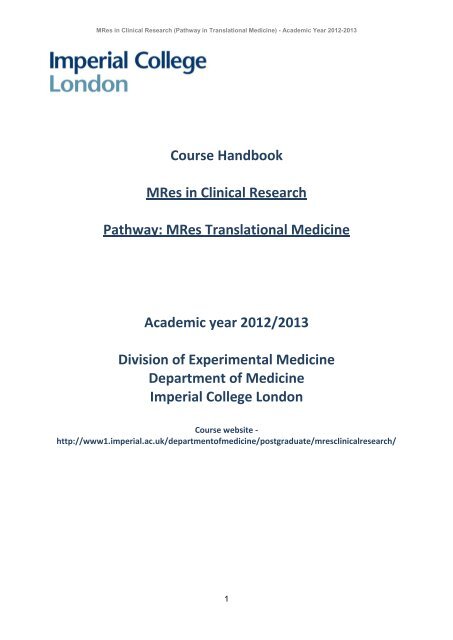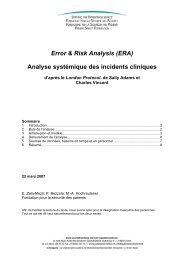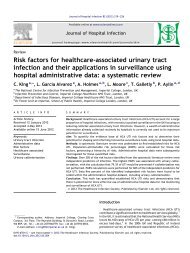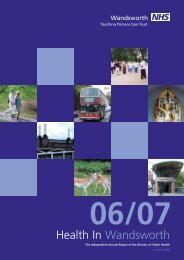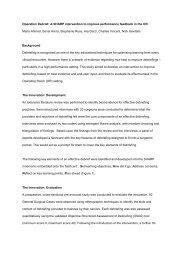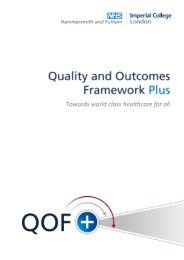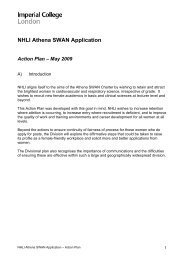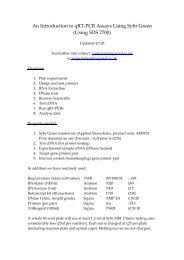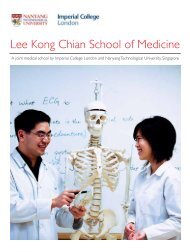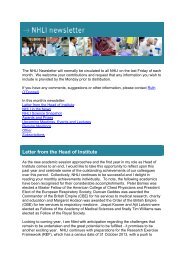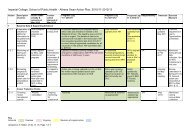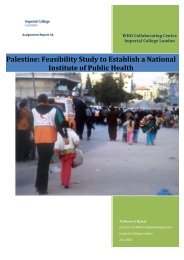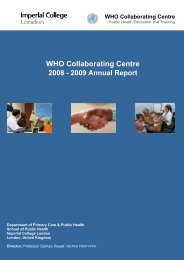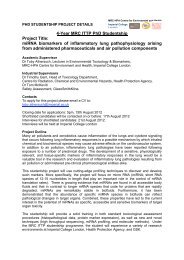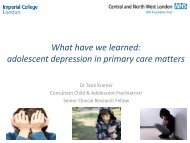MRes Translational Medicine Academic year 2012/2013 Division of ...
MRes Translational Medicine Academic year 2012/2013 Division of ...
MRes Translational Medicine Academic year 2012/2013 Division of ...
You also want an ePaper? Increase the reach of your titles
YUMPU automatically turns print PDFs into web optimized ePapers that Google loves.
<strong>MRes</strong> in Clinical Research (Pathway in <strong>Translational</strong> <strong>Medicine</strong>) - <strong>Academic</strong> Year <strong>2012</strong>-<strong>2013</strong>The Graduate SchoolIntroduction by Pr<strong>of</strong>essor Andrew GeorgeWelcome to the Graduate School. At Imperial we aim for our students not only to have an excellentresearch experience, but also to develop other skills that will enhance their effectiveness asscientists. The Graduate School therefore provides a large number <strong>of</strong> courses to develop yourtransferrable skills. These include a range <strong>of</strong> short workshops, which <strong>of</strong>fers a great opportunity tomeet fellow students from other parts <strong>of</strong> the College and establish contacts and friends that willremain with you throughout your time here. The skills developed during these courses are highlyvalued in the job market.We also run a number <strong>of</strong> events during the <strong>year</strong> which are an opportunity to broaden yourknowledge and to meet other students. We will be hosting a number <strong>of</strong> lectures, as well asorganising social events. I would encourage you to take part in these – there are times when it canfeel lonely as a research student and these events are an opportunity to be part <strong>of</strong> the widercommunity <strong>of</strong> research students, including those currently undertaking their PhDs. In addition, many<strong>of</strong> the advances in science and engineering happen at the boundaries between disciplines, andmeeting students from other Departments and Faculties <strong>of</strong>fers opportunities to enrich yourresearch.The Graduate School also ensures the quality <strong>of</strong> the PhD programmes at Imperial, and makes surethat you if you choose to undertake a PhD after your Masters study, you are appropriatelysupported to maximise the chance <strong>of</strong> success. Most <strong>of</strong> this important work happens behind thescenes, but there are opportunities for you to get involved, through the Graduate StudentAssociation (GSA) who not only provide representation for the student body but also run their ownprogramme <strong>of</strong> social events.I hope that you will enjoy your postgraduate research here at Imperial, and I wish you well in yourtime with us.Pr<strong>of</strong>essor Andrew GeorgeDirector <strong>of</strong> the Graduate School----------------------As soon as you begin your postgraduate studies at Imperial College you automatically become amember <strong>of</strong> the Graduate School. Membership means you become part <strong>of</strong> a wider community,broadening and enriching your academic experience.http://www3.imperial.ac.uk/graduateschool2
<strong>MRes</strong> in Clinical Research (Pathway in <strong>Translational</strong> <strong>Medicine</strong>) - <strong>Academic</strong> Year <strong>2012</strong>-<strong>2013</strong>ContentsThe Graduate School ................................................................................... 2Contents ..................................................................................................... 3Part A – Overview / Introduction………………………………………………………………...4Introduction ................................................................................................ 4Welcome to the <strong>MRes</strong> Clinical Research programme (TM pathway) at Imperial CollegeLondon……………………………………………………………………………………………..4Programme Structure .................................................................................. 9Examination and Assessment…………………………………………………………………..9Calendar <strong>of</strong> Important dates ..................................................................... 11Key Term Dates: academic <strong>year</strong> <strong>2012</strong>-<strong>2013</strong>………………………………………………...11Expectations ............................................................................................. 11Blackboard (VLE) ....................................................................................... 12Campus Information ................................................................................. 13Part B – What you can expect…………………………………………………………………14Facilities .................................................................................................... 14Teaching and Assessment ......................................................................... 15The lecture programme – .......................................................................... 15Module 1: Introduction to Clinical Research, Governance and Medical Statistics………16Module 2: Bench to Bedside, Clinical Trials and Experimental <strong>Medicine</strong> Tools………...17Module 3: Therapeutics………………………………………………………………………..17Module 4: Specialist Module in <strong>Translational</strong> <strong>Medicine</strong>…………………………………….18The research project ................................................................................. 18Pastoral and <strong>Academic</strong> Support ................................................................. 20Evaluation and Quality Assurance ............................................................. 21Part C – Important Links and Appendices……………………………………………………22Template for student project report form ................................................. 22Marking criteria and template for dissertation .......................................... 23APPENDIX I: Policy on Scientific Misconduct ............................................. 27APPENDIX II: Students with disabilities, specific learning difficulties, longtermhealth issues ..................................................................................... 29Guidelines for <strong>MRes</strong> research and final research reports (<strong>MRes</strong> Thesis) .... 31Key Course Reading ................................................................................... 373
<strong>MRes</strong> in Clinical Research (Pathway in <strong>Translational</strong> <strong>Medicine</strong>) - <strong>Academic</strong> Year <strong>2012</strong>-<strong>2013</strong>Part A – Overview / IntroductionIntroductionWelcome to the <strong>MRes</strong> Clinical Research programme (TM pathway) at Imperial CollegeLondon.The course comprises four pathways (<strong>MRes</strong> <strong>Translational</strong> <strong>Medicine</strong>, <strong>MRes</strong> Clinical Research Designand Management, <strong>MRes</strong> Cellular Pathology and <strong>MRes</strong> Human Nutrition).The <strong>MRes</strong> in <strong>Translational</strong> <strong>Medicine</strong> pathway has been designed for post-graduate students withMBBS or BSc degrees. It combines an introduction to the theory behind and technologies currentlyused in drug discovery, pharmacokinetics, role <strong>of</strong> biomarkers and surrogate endpoints, preclinicalsafety assessment, first-time-in-human studies, clinical investigation paradigms, researchgovernance and medical statistics.This programme capitalises on the excellence in experimental medicine and clinical research atImperial College London and Imperial College Healthcare NHS Trust. Imperial College London isranked in the top 4 internationally for Biomedicine and its associated clinical campuses are widelyrecognised as centres <strong>of</strong> excellence for clinical research.Teachers from academia and industry and an excellent basic and clinical research infrastructureprovide an appropriate environment for advanced, hands-on training in the theoretical and practicalaspects <strong>of</strong> clinical research. This course intends to develop highly skilled and motivated academicclinical scientists for the future.Investigators with diverse backgrounds, from systems biology to specific disease areas –inflammation, cardiovascular, respiratory, metabolic medicine, oncology, neuro-psychiatric diseases– will provide guidance on a variety <strong>of</strong> topics embraced by <strong>Translational</strong> <strong>Medicine</strong>, includingcomponents <strong>of</strong> the critical pathway for drug development, the design and conduct <strong>of</strong> early phasestudies in humans, ethics and research governance, through interactive, plenary sessions,discussions and networking opportunities.Programme aims:To provide students with the theoretical aspects <strong>of</strong> supporting and managing clinicalresearch. To this end, the lecture programme will cover major aspects <strong>of</strong> clinical trialregulation and governance, study design and implementation, clinical skills across sometherapeutic areas, and research dissemination skills.To enable students to put the underpinning theory into practice by contributing to clinicalresearch, taking responsibility for a project and producing a project report.To give students the opportunity to obtain an understanding <strong>of</strong> research methodologies bystudying in a World-leading clinical research environment.To equip students to pursue clinical academic careers, or to undertake employment either asClinical Trial Coordinators or in Research and Development.Familiarise students with the challenges facing research in healthcare and translatingevidence into practice.4
<strong>MRes</strong> in Clinical Research (Pathway in <strong>Translational</strong> <strong>Medicine</strong>) - <strong>Academic</strong> Year <strong>2012</strong>-<strong>2013</strong>The programme has been deliberately designed to cover a broad spectrum <strong>of</strong> clinical specialitiesincluding oncology, metabolic medicine, cardiovascular medicine, and neuroscience. While allstudents will be required to follow this broad curriculum, the opportunity to specialise in a particulararea will be provided through the research project.Students who successfully complete the course will have knowledge and understanding <strong>of</strong>:How new interventions with therapeutic potential are assessed in humans (volunteers andpatients).Patient safety assessment.Good Clinical Practice.The critical pathway for drug development.Clinical trial design.Common statistical techniques.The essential facts, concepts, principles and theories relevant to the student’s theme <strong>of</strong>subsequent research.Management and communication skills, including problem solving, project design, decisionprocesses, teamwork, written and oral reports and scientific publications.The skills will be developed through:Four teaching modules that will cover both core and more specialised topics.Regular teaching days on elected topics and skills.Hands-on clinical research experience.Dedicated training in core transferable skills including preclinical and research disseminationskills.A major research project over the duration <strong>of</strong> the programme.The course is structured along two complementary lines: the lecture programme and individualstudent research projects within research laboratories with diverse research interestsGraduates <strong>of</strong> this course will have an awareness <strong>of</strong> clinical experimental medicine and translationalresearch, which provides an ideal background to students who wish to pursue a PhD and a career ina clinical research environment.A list <strong>of</strong> course readings is appended at the back <strong>of</strong> this handbook.-------------------------------------------------------------------------------------This handbook is designed to provide students with key information on the <strong>MRes</strong> in Clinical Research<strong>of</strong>fered by the <strong>Division</strong> <strong>of</strong> Experimental <strong>Medicine</strong>, Department <strong>of</strong> <strong>Medicine</strong>.Please note that all dates are valid for the academic <strong>year</strong> <strong>2012</strong>-13 and are subject to change. Pleasecheck your Imperial College email regularly to ensure that you are up to date with any changes. Youshould retain this handbook for future reference.http://www3.imperial.ac.uk/students5
<strong>MRes</strong> in Clinical Research (Pathway in <strong>Translational</strong> <strong>Medicine</strong>) - <strong>Academic</strong> Year <strong>2012</strong>-<strong>2013</strong>For more general information on College and Faculty student issues, please consult the onlineCollege Student pages in the link above. There is important information about start <strong>of</strong> sessionarrangements, student loans and Council Tax to which you should pay particular attention.Inevitably, a few <strong>of</strong> you will encounter situations that are not covered in the handbook; if so, you areinvited to seek advice from your course administrator, course organiser or any appropriate Collegestaff.6
<strong>MRes</strong> in Clinical Research (Pathway in <strong>Translational</strong> <strong>Medicine</strong>) - <strong>Academic</strong> Year <strong>2012</strong>-<strong>2013</strong>Course Director,Chair <strong>of</strong> ExaminersPr<strong>of</strong>essor Martin Wilkinsm.wilkins@imperial.ac.ukCourse OrganiserDr Vincenzo Libriv.libri@imperial.ac.ukCollege TutorExternal Examiner<strong>MRes</strong> Course CommitteeDr Michael Jonesm.d.jones@imperial.ac.ukDr Ross BreckenridgeUniversity College LondonPr<strong>of</strong>essor Martin WilkinsPr<strong>of</strong> Gary FrostDr Vincenzo LibriDr Rohini SharmaDr Roberto DinaMr Shokri OthmanDr Karen MosleyDr Mary HicksonDr Les HusonPr<strong>of</strong>essor Chris NortonCourse AdministrationMiss Fiona Bibbyemail: f.bibby@imperial.ac.ukTel: 020 8383 6114Office location: 173B Hammersmith House (1st Floor).Education ManagerDepartment <strong>of</strong> <strong>Medicine</strong>Mrs Rita AndrewsEmail: rita.andrews@imperial.ac.ukTel: 020 8383 1939If you have any queries or concerns regarding the programme, please contact Fiona Bibby(course administrator) in the first instance.Student representativesStudents will elect two course representatives per pathway who will attend the Staff-StudentCommittee meetings in order to voice concerns, give feed-back, and relay messages to allstudents. The minutes <strong>of</strong> the Committee Meetings will be circulated to the students.7
<strong>MRes</strong> in Clinical Research (Pathway in <strong>Translational</strong> <strong>Medicine</strong>) - <strong>Academic</strong> Year <strong>2012</strong>-<strong>2013</strong>Important contact informationCourse postal address<strong>MRes</strong> Clinical ResearchImperial College London, Hammersmith Campus<strong>Division</strong> <strong>of</strong> Experimental <strong>Medicine</strong>, Department <strong>of</strong> <strong>Medicine</strong>(1st floor Hammersmith House – CPG6)Du Cane Road, London W12 0NSOther important contactsGeneral UK emergency contact999 – dial in case <strong>of</strong> danger, crime or risk to lifeHammersmith Campus security contactsExt 3333 - College emergency 24hHead <strong>of</strong> security at Hammersmith Campus: Cetin Avsarc.avsar@imperial.ac.ukTel: 020 8383 2242ICT helpdesk020 759 49000service.desk@imperial.ac.uk8
<strong>MRes</strong> in Clinical Research (Pathway in <strong>Translational</strong> <strong>Medicine</strong>) - <strong>Academic</strong> Year <strong>2012</strong>-<strong>2013</strong>Programme Structure(Including requirements for completion <strong>of</strong> programme)The course comprises <strong>of</strong> a taught element – 4 modules assessed by 3 exams and a research element(thesis and viva), please see the following assessment breakdown –Examination and AssessmentElements Weighting Components AssessmentExaminations 30%Project 70%3 written papers(equally weighted)Thesis (70%)Viva (30%)9Double markedinternally and viewedby external examinerMark agreed afterviva by internal andexternal examinerThe written examinations are designed to assess the taught part <strong>of</strong> the programme structured in 4modules. There will be three written exams, each <strong>of</strong> which will be 90 minutes long (module 1 examalso includes an additional 60 minutes reading time).A project report thesis (to be submitted in the final month <strong>of</strong> the programme) and viva voceexamination will constitute the final examination. Students will also be asked to produce a poster fortheir Viva examination.The Board <strong>of</strong> Examiners will comprise the course director as chair, a panel <strong>of</strong> internal examinersfrom the course management committee, and an external examiner. The principal function <strong>of</strong> theexternal examiner is to ensure that standards achieved by students on this <strong>MRes</strong> course aresatisfactory, and that recommended awards are consistent with similar courses across the UK.To qualify for the award <strong>of</strong> <strong>MRes</strong> students must complete all the course requirements and mustachieve an overall pass mark in the both the taught element (combined examinations) and in theresearch element (research project and viva voce), with the pass mark set at 50%. The weighting <strong>of</strong>marks contributing to the degree is 30:70, for the examinations and research project respectively.Summary <strong>of</strong> grades, marks and their interpretation for module exams and final <strong>MRes</strong> degreeclassification:GRADE MARKS INTERPRETATIONA 70% - 100% Marks represent a distinction performanceB 60% - 69% Marks represent a merit performanceC 50% - 59% Marks represent a passD 40% - 49% Marks represent a fail performance at <strong>MRes</strong> levelF 0% - 39% Marks represent a critical fail performance (with major shortcomings)In order to pass the taught element <strong>of</strong> the programme, students must achieve an overall grade <strong>of</strong>50% or higher across the 3 written examinations. If a student obtains 40-49% (a D grade) in a moduleexam, this would be classed as a fail, but they could still pass the taught element if their overallaverage <strong>of</strong> the 3 exams was equal to or greater than 50%. Should students express a wish to re-sit amodule exam for which they have obtained a D grade (40-49%), the decision would be made by theBoard <strong>of</strong> Examiners.
<strong>MRes</strong> in Clinical Research (Pathway in <strong>Translational</strong> <strong>Medicine</strong>) - <strong>Academic</strong> Year <strong>2012</strong>-<strong>2013</strong>If students obtain a critical fail (0 – 39%), the mark cannot be included within the overall average <strong>of</strong>the 3 exams and they will be required to re-sit the exam at the next naturally occurring sitting. Onlyone re-sit will be permitted for each exam.A candidate re-entering any part <strong>of</strong> the examination will normally only be credited with a bare passmark if successful. Re-entry candidates may also not normally be considered for a merit ordistinction classification.If a student receives a D grade (40-49%), in both the first sit and the re-sit, on that occasion thehigher <strong>of</strong> the two marks would be taken.Students will be provided with mock questions/past paper(s) for each exam.Upon completion <strong>of</strong> the course students will receive an overall result e.g pass, merit, distinction.They will also receive: Overall mark for the 3 exams Viva mark Agreed Thesis markMitigating CircumstancesExtenuating circumstances can be outlined by students in relation to written exams or the writtenresearch project. Students must complete the appropriate paperwork which can be obtained fromthe course administrator (or on the Imperial College website) at least 5 working days prior toassessment. You will be asked to supply reasoning for your request.Detailed information on all post-graduate examination rules and regulations including studentprogress, re-sits, failure, extensions, etc., can be found on the College Registry web pages at thefollowing link –http://www3.imperial.ac.uk/registry/proceduresandregulations/regulationsPlagiarismImportant notice: details <strong>of</strong> plagiarism guidelines are appended at the end <strong>of</strong> this document.Students are advised to read the College information on plagiarism at the following links –http://www3.imperial.ac.uk/registry/exams/exam<strong>of</strong>fenceshttp://www3.imperial.ac.uk/library/subjectsandsupport/plagiarismAttendanceStudents are required to attend all lectures. If you are unwell, please let the course administratorknow. Attendance is monitored throughout the lecture timetable.Each pathway will have regular meetings to discuss and present their research and/or hold journalclubs. At the start <strong>of</strong> the course students are provided dates for the <strong>year</strong>. Attendance is monitored ateach meeting.Students will be required to submit regular reports outlining the status <strong>of</strong> their projects and will beprovided with submission dates at the start <strong>of</strong> the <strong>year</strong>. Students will be expected to produce a10
<strong>MRes</strong> in Clinical Research (Pathway in <strong>Translational</strong> <strong>Medicine</strong>) - <strong>Academic</strong> Year <strong>2012</strong>-<strong>2013</strong>report at each deadline (every 6-8 weeks). Reports need to be signed <strong>of</strong>f by supervisors and emailedto the course administrator.Please see further details regarding student attendance requirements in the appendix <strong>of</strong> thisdocument.Calendar <strong>of</strong> Important datesKey Term Dates: academic <strong>year</strong> <strong>2012</strong>-<strong>2013</strong>Autumn Term <strong>2012</strong>Start <strong>of</strong> Term Saturday 29 th September <strong>2012</strong>End <strong>of</strong> Term Friday 14 th December <strong>2012</strong>Spring Term <strong>2013</strong>Start <strong>of</strong> Term Saturday 5 th January <strong>2013</strong>End <strong>of</strong> Term Friday 22 rd March <strong>2013</strong>Summer Term <strong>2013</strong>Start <strong>of</strong> Term Saturday 27 th April <strong>2013</strong>End <strong>of</strong> Term Friday 28 th June <strong>2013</strong>Timelines for individual research and writing up during the summer period will be agreed betweenthe student and the supervisor.Project hand in & vivaThesis hand in deadlinePoster hand in deadlineOral examination – viva voceEnd <strong>of</strong> academic <strong>year</strong> (course ends)Full time students: 16 th August <strong>2013</strong>Part time students: 15 th August 2014Full time students: 6 th September <strong>2013</strong>Part time students: 5 th September 2014Full time students: September <strong>2013</strong>Part time students: September 2014Full time students: end <strong>of</strong> September <strong>2013</strong>Part time students: end <strong>of</strong> September 2014College closure dates and holidaysPlease refer to the College calendar when booking your holidays. Attendance at all lectures, practicalsessions and seminars is compulsory for all students. As your holidays should not interfere with youragreed project timeline, we recommend that you discuss your plans in advance with all <strong>of</strong> yoursupervisors. All College closure dates can be found at:http://www3.imperial.ac.uk/hr/procedures/leave/collegeclosuresExpectationsWhat to expect from the course and what is expected from you.11
<strong>MRes</strong> in Clinical Research (Pathway in <strong>Translational</strong> <strong>Medicine</strong>) - <strong>Academic</strong> Year <strong>2012</strong>-<strong>2013</strong>AttendanceAttendance at lectures and group meetings is compulsory. If you feel you are unlikely to be able toattend, please discuss with the course administrator. Please see further details relating toattendance in the appendix.SicknessIf you are unwell and unable to attend lectures/group meetings, please let the course administratorknow. If you are unwell over a period <strong>of</strong> time and you are concerned that this may have an effect onthe course, please inform the course administrator and you may be advised to obtain a doctor’snote. If you are unable to attend an exam due to illness – you will need to provide a doctor’s note.Progress and performanceThe course organisers will be happy to provide feedback on exam performance if requested. Yourproject progress will be monitored through regular meetings with your supervisors, group meetingswith the course organisers and submission <strong>of</strong> a report every 6 – 8 weeks.CommunicationPlease ensure you check you ICL email account regularly as you will be informed <strong>of</strong> any importantannouncements or important messages via email.Code <strong>of</strong> Student DisciplineThis Code <strong>of</strong> Student Discipline provides for the hearing <strong>of</strong> complaints concerning breaches <strong>of</strong>discipline by students, and for rights <strong>of</strong> appeal where appropriate, and sets down the penalties thatmay be imposed, including termination <strong>of</strong> membership <strong>of</strong> the Collegehttp://www3.imperial.ac.uk/secretariat/collegegovernance/provisions/ordinances/e2Student Complaints and Appealshttp://www3.imperial.ac.uk/registry/proceduresandregulations/policiesandprocedures/complaintsappealsRegistering your ConcernAs part <strong>of</strong> our continuing care to students, we would like to draw your attention to the charter andstatutes which covers the course. Within this you will find the correct procedure for registering yourconcerns and the process for escalating it:http://www3.imperial.ac.uk/secretariat/collegegovernance/provisions/ordinances/e3Blackboard (VLE)At the start <strong>of</strong> the course you will be set up with access details to Blackboard. Blackboard allowsstudents to easily access course documents such as lectures slides, which are uploaded during themodule weeks. Link to Blackboard http://learn.imperial.ac.uk Find out more -http://www3.imperial.ac.uk/ict/services/teachingandresearchservices/elearning/vle12
<strong>MRes</strong> in Clinical Research (Pathway in <strong>Translational</strong> <strong>Medicine</strong>) - <strong>Academic</strong> Year <strong>2012</strong>-<strong>2013</strong>Campus InformationLocation and other important sitesCampus maps - all Imperial College campus locations and relevant information can be found on theCollege website - http://www3.imperial.ac.uk/campusinfoHammersmith CampusReaching Hammersmith CampusBy bus: Buses No. 7, 70, 72, 272, 283 all stop in front <strong>of</strong> the hospitalBy Tube: Take the Central Line to White City, East Acton or the Hammersmith and City line to Woodlane. The Campus is a 15 minute walk from any <strong>of</strong> these stations.Wellcome Trust - McMichael Clinical Research Facility (WTCRF)Set up in 2000, the Sir John McMichael Centre comprises two wards embedded in the HammersmithHospital. The centre shares its site and many facilities with the Department <strong>of</strong> Oncology (cancertreatment) at Hammersmith Hospital. The Centre specialises in early pro<strong>of</strong>-<strong>of</strong>-concept clinicalstudies across a range <strong>of</strong> disciplines, including neuroscience, psychiatry, oncology, rheumatology andmetabolic, cardiovascular and respiratory medicine. Studies are usually investigator-led, making themost <strong>of</strong> the scientific expertise on site and the imaging and technology platforms that supportclinical research.A new and larger Clinical Research Facility (which is part <strong>of</strong> the Wellcome Trust Clinical ResearchNetwork) has been completed within the Hammersmith Campus site and opened in May <strong>2012</strong>. Aswell as expanding the capacity for clinical research, the new Centre will capitalise on existingacademic-industry collaborations and provide extensive opportunities for undertaking more clinicaltrials, in both healthy volunteers and patients.South Kensington CampusImperial College LondonExhibition Road,London SW7 2AZTel +44 (0)20 7589 5111St Mary’s CampusSt. Mary's Hospital IC CampusNorfolk PlaceLondon, W2 1PGTel (switchboard) +44 20 7589 5111Reaching St Mary’s by Tube or Rail: take the Hammersmith & City, District or Circle Lines toPaddington Station. The St. Mary's Campus is a five minute walk.13
<strong>MRes</strong> in Clinical Research (Pathway in <strong>Translational</strong> <strong>Medicine</strong>) - <strong>Academic</strong> Year <strong>2012</strong>-<strong>2013</strong>Part B – What you can expectFacilitiesLibrary Facilities & Students lockersPlease consult the Library WebPages for detailed information on all Imperial College libraries.http://www3.imperial.ac.uk/libraryThe Hammersmith Campus library is located on the 1st floor, Commonwealth Building. The libraryholds books and an excellent range <strong>of</strong> periodicals covering all <strong>of</strong> the themes <strong>of</strong> the <strong>MRes</strong>programme. Among the collection's strengths are: Endocrinology, Genetics, Haematology,Immunology, Molecular biology, Neonatology, Obstetrics & gynaecology, Oncology, Pathology,Radiology. The library staff provide guided tours <strong>of</strong> the facilities and training in on-line literaturesearching.Telephone: +44 (0)20 8383 3246Email: lib.hamm@imperial.ac.ukStudent lockersAre available in the Wolfson Building (1st floor, left <strong>of</strong> seminar rooms 3,4,5)– keys can be obtainedfrom the Undergraduate <strong>Medicine</strong> Office (UMO) on the Ground Floor (Wolfson). A £10 chequedeposit is required. This may be useful for those <strong>of</strong> you who do not have an <strong>of</strong>fice to leave yourproject documents and personal belongings. More lockers are available on other campuses, do nothesitate to let us know if you need help finding out about these.IT Facilities, Email & IT HelpdeskEach new member <strong>of</strong> College is provided with a login name and password which provide access tothe many IT and library facilities within the College. Your account is set up in advance and you canactivate it using the online account activation page. Your login name and password are for yourpersonal use only and must not be used to permit any other person to gain access to the Collegenetwork or its attached resources, or through it the internet. Regulations on the use <strong>of</strong> IT facilities atImperial are detailed on the website - http://www3.imperial.ac.uk/students/You can access your College email account online via - https://exchange.imperial.ac.uk.Wireless Service on Campus: Hammersmith HospitalWireless access is current available throughout the Commonwealth Building and in the WolfsonEducation Centre.Cluster RoomsComputers are available for student use in the Commonwealth building: 3rd floor computer lab &1st / ground floor library training facility.ICT Service deskwww.imperial.ac.uk/ict/servicedesk; Email: service.desk@imperial.ac.ukTel.: +44 (0)20 759 49000, or just 49000 from Hammersmith campus landlines.The central service desk is available for telephone, email or online queries Monday to Friday 08.30–18.00 except during College closures. The Hammersmith ICT service desk <strong>of</strong>fice is located in theBasement, Commonwealth building and it <strong>of</strong>fers drop-in lunchtime session. The central service desk,for all-day drop in sessions, is located on the 4th floor <strong>of</strong> the Sherfield building at South Kensington.14
<strong>MRes</strong> in Clinical Research (Pathway in <strong>Translational</strong> <strong>Medicine</strong>) - <strong>Academic</strong> Year <strong>2012</strong>-<strong>2013</strong>The PrinciplesYou may be aware that the government’s White Paper, Students at the Heart <strong>of</strong> the System,published in June 2011, endorsed the recommendation made by a national Student Charter WorkingGroup that each institution should have a student charter, or similar high level statement, to set outthe mutual expectations <strong>of</strong> universities and students.At its June <strong>2012</strong> meeting the Senate approved a Student Charter for the College, entitled OurPrinciples, and agreed that this would be launched during summer <strong>2012</strong>. The Principles weredeveloped by a College Working Group including representatives <strong>of</strong> all Faculties and undergraduateand postgraduate students.The Principles define the guiding principles <strong>of</strong> the College community and cover all students, bothundergraduate and postgraduate. They are not a legal contract but rather an easily accessible,concise source <strong>of</strong> information and a clear display <strong>of</strong> staff, student and ICU collaboration. ThePrinciples display the signatures <strong>of</strong> the College’s President & Rector and the ICU President. They willbe reviewed annually by the Quality Assurance Advisory Committee.The Principles are available at: http://www3.imperial.ac.uk/students/ourprinciplesEach Principle is accompanied by ‘drop-down’ text, which elaborates upon the overarchingstatements and provides links to further information. The Principles will also be made available tostudents on Imperial Mobile shortly.Teaching and AssessmentThe taught element <strong>of</strong> the course is assessed by 3 exams covered in 4 modules (set across 4 fullweeks across the <strong>year</strong>)The lecture programme –The teaching structure will consist <strong>of</strong> 4 taught modules, each covered in 5-day blocks <strong>of</strong> lectures. Theremaining time will be allocated to projects and self-study.The first 3 core modules will be compulsory for all <strong>MRes</strong> pathways. The fourth module will differ foreach <strong>MRes</strong> pathway and will provide specialist knowledge in the chosen discipline. Topics covered inlectures will be reflected in the end <strong>of</strong> module exams.Lectures will cover the principles <strong>of</strong> drug and biomarker discovery, clinical trial design andmanagement, the role <strong>of</strong> biomarkers and surrogate endpoints, emerging technologies in medicalresearch, clinical investigation paradigms, research governance and medical statistics. Lectures andpractical sessions will be complemented by tutorials, journal clubs, student presentations andquestion and answer sessions.In addition to the marked exams, students will be required to submit some additional informativework including presentations, posters, regular project progress reports and invited to attend keyconferences and talks.15
<strong>MRes</strong> in Clinical Research (Pathway in <strong>Translational</strong> <strong>Medicine</strong>) - <strong>Academic</strong> Year <strong>2012</strong>-<strong>2013</strong>Welcome week(1 st – 5 th Oct <strong>2012</strong>)Core Module 1(8 th -12 th October <strong>2012</strong>)Core Module 2(14 th – 18 th Jan <strong>2013</strong>)Core Module 3(18 th – 22 rd March <strong>2013</strong>)Pathway specific Module 4(13 th – 17 th May <strong>2013</strong>)Inductions (Heath and Safety; Security Badges;Library),Introductory talksProjects discussion.Introduction to Clinical ResearchMedical GovernanceCritical AppraisalMedical StatisticsBench to BedsideClinical Trial Design and ImplementationClinical and Experimental <strong>Medicine</strong> Tools in ClinicalResearchTherapeutics (inflammatory, cardiovascular,respiratory, metabolic, oncology and neuropsychiatricdiseases.Specialist Module (<strong>Translational</strong> <strong>Medicine</strong>)1 st Exam(3 rd Dec<strong>2012</strong>)2 nd Exam(Mar/April<strong>2013</strong>)3 rd Exam(June <strong>2013</strong>)Part-time students can choose to attend all modules and relative exams during the first <strong>year</strong> <strong>of</strong> thecourse or they can choose to; Attend core modules 1 and 2 during <strong>year</strong> 1 (and sit the first written exam during the same<strong>year</strong>) Attend core module 3 and specialist module 4 during <strong>year</strong> 2 and sit the second and thirdwritten exams during the second <strong>year</strong> <strong>of</strong> the course.Module 1: Introduction to Clinical Research, Governance and Medical StatisticsModule convenors: Dr Karen Mosley, Dr Mary Hickson, Dr Les HusonThe first three days <strong>of</strong> the module, along with a compulsory e-learning element (see page 18/19),aim to provide students with a thorough grounding in the methods required to design andimplement a clinical research study. The module also covers all aspects <strong>of</strong> Good Clinical Practice(GCP) and regulatory requirements and provides students with the necessary tools to facilitate aclinical research project from conception to end <strong>of</strong> study. A workshop with the library will cover thecriteria for searching the literature in a systematic and comprehensive manner and a workshop oncritical appraisal will cover how to critically evaluate research papers to confidently identify robustand valid published literature.During the second part <strong>of</strong> the module (days 4 and 5) students will learn basic statistical skills to carryout descriptive data analysis, to estimate parameters such as means and variances, and to carry outand interpret hypothesis tests. Statistical concepts covered in this module will include randomisationand blinding, sample size calculations and specific types <strong>of</strong> statistical significance test comparingmeans and medians, proportions, type I and type II errors, p-values, confidence intervals, simplelinear regression and correlation analysis. Lectures will be complemented by a number <strong>of</strong> practicalclasses on data analysis.Dr Les Huson will be available for one-to-one discussions <strong>of</strong> any statistical issue arising during thecourse <strong>of</strong> your work, and in particular issues connected with your project. To book a session pleasecontact Dr Huson via email - (l.huson@imperial.ac.uk).16
<strong>MRes</strong> in Clinical Research (Pathway in <strong>Translational</strong> <strong>Medicine</strong>) - <strong>Academic</strong> Year <strong>2012</strong>-<strong>2013</strong>Module 2: Bench to Bedside, Clinical Trials and Experimental <strong>Medicine</strong> ToolsModule convenors: Dr V Libri, Dr Rohini Sharma, Dr Roberto DinaThis module will focus on the key elements <strong>of</strong> clinical research and the role <strong>of</strong> surrogate markers andemerging technologies in drug development, from preclinical discovery through first-time-in-human(FTIH) studies and early phase clinical trials in patients. Advantages and limitations <strong>of</strong> animal models<strong>of</strong> diseases, principles <strong>of</strong> pharmacokinetics, prediction <strong>of</strong> likely therapeutic doses, extrapolation <strong>of</strong>preclinical findings to human diseases and the clinical applicability/validity <strong>of</strong> marker endpoints willbe covered. Lectures will also give an overview <strong>of</strong> the classification and staging <strong>of</strong> cancer and thespecific pathways required for the development <strong>of</strong> oncology drugs.The module will cover a wide range <strong>of</strong> topics in the following areas: Preclinical Research (e.g. principles <strong>of</strong> drug discovery; gene expression pharmacogenomicsand proteomics; animal models <strong>of</strong> diseases) Drug Development (e.g. target identification and candidate molecule selection; preclinicalassessment <strong>of</strong> drug toxicity; FTIH and pro<strong>of</strong>-<strong>of</strong>-concept (POC) studies; patients selection;principles <strong>of</strong> pharmacokinetics; surrogate biomarkers and safety markers) Imaging and Experimental <strong>Medicine</strong> Technologies (e.g. magnetic resonance imaging;positron emission tomography and radiotracers; spectroscopy and other imaging modalities)Module 3: TherapeuticsModule convenors: Dr V Libri, Dr Rohini Sharma, Pr<strong>of</strong> Gary Frost and Dr Mary HicksonThis module will introduce students to the complexity <strong>of</strong> clinical trials in across a broad range <strong>of</strong>human diseases, including inflammatory, cardiovascular, respiratory, metabolic medicine, oncologyand neuro-psychiatric diseases. The purpose is to allow students to gain a thorough understanding<strong>of</strong> the challenges in setting up clinical trials in these therapeutic areas. Alongside basic principles andchallenges <strong>of</strong> diseases, emphasis will be put on the cutting edge <strong>of</strong> novel clinical endpoints,emerging platform technologies and clinical biomarkers.Teaching is designed to allow students to gain a comprehensive understanding <strong>of</strong> the basicpathological processes and diagnostic techniques used in the assessment <strong>of</strong> the above diseases.Lectures will be complemented by a number <strong>of</strong> sessions on diagnostic methods to provideunderstanding <strong>of</strong> the main areas <strong>of</strong> investigation in clinical practice and on the use <strong>of</strong> morphologicaland molecular techniques in the understanding <strong>of</strong> human diseases. Among other topics, lectures willprovide knowledge <strong>of</strong> tests and procedures used in the diagnosis, prognosis and treatment <strong>of</strong> cancerand their application to oncology trials. The objectives <strong>of</strong> these sessions are to prepare students forthe planning and management <strong>of</strong> clinical trials and studies in the area <strong>of</strong> oncology while providingthe necessary knowledge and skills to also meet the potentially complex and sensitive needs <strong>of</strong> theoncology patient.By the end <strong>of</strong> the module, students will have an enhanced awareness <strong>of</strong> the challenges andcomplexity <strong>of</strong> specific human pathologies and will be able to recognise and exploit potential enablingtechnologies within the context <strong>of</strong> clinical trials.17
<strong>MRes</strong> in Clinical Research (Pathway in <strong>Translational</strong> <strong>Medicine</strong>) - <strong>Academic</strong> Year <strong>2012</strong>-<strong>2013</strong>Module 4: Specialist Module in <strong>Translational</strong> <strong>Medicine</strong>Module convenor: Dr V LibriThis module aims to further enhance student skills and knowledge in clinical research andtranslational medicine. A recurrent theme <strong>of</strong> this module is the use <strong>of</strong> biomarkers andpharmacodynamics endpoints in early phase exploratory studies to provide an initial indication <strong>of</strong>whether novel putative therapies may be sufficiently promising to justify the conduct <strong>of</strong> larger-scale,and longer-term, clinical trials. Consideration will also be given to human volunteer models andclinical study designs that may be used to either identify factors associated with risk, onset andprogression <strong>of</strong> diseases or to assess response to treatments and PK/PD relationships, which mayenhance predictability <strong>of</strong> drug efficacy in patients.The process <strong>of</strong> selection, development and validation <strong>of</strong> biomarkers will be emphasised withreference to specific diseases, including rare diseases, and the difficulties <strong>of</strong> studying drug efficacy insmall patient populations. Lectures will be integrated by practical sessions on the use and validity <strong>of</strong>biomarkers, surrogate endpoints, imaging and non-imaging technologies to advance drug discoveryand novel therapies. Alternative trial designs and advanced statistical methods <strong>of</strong> data analysis willalso be covered, as well as students will have the opportunity to shadow clinical trials at theWellcome Trust- McMichael Clinical Research Facility (WTMCRF).By the end <strong>of</strong> the module students will become familiar with the use <strong>of</strong> technologies in clinicalresearch, and the main principles underpinning the design and implementation <strong>of</strong> clinical trials forearly demonstration <strong>of</strong> drug efficacy based on conventional clinical endpoints and surrogate markers<strong>of</strong> diseases.Module details, including timetables will be available ahead <strong>of</strong> the module weeks.The research projectDuring the research period (one-<strong>year</strong> or two-<strong>year</strong> programme for full-time and part-time students,respectively), students are expected to design and undertake a research project. The purpose <strong>of</strong> theproject is to gain practical experience in supervised clinical and/or laboratory-based research.Students will be provided training in academic research and acquisition <strong>of</strong> practical skills, includingthe design <strong>of</strong> a research project, planning <strong>of</strong> experiments, dealing with practical problems,recording, presenting and analysing data. Research projects will comprise a literature survey on anassigned research area, preparation <strong>of</strong> a written report and presentation <strong>of</strong> proposed experimentalwork in seminars, conduct <strong>of</strong> experimental work and finally writing up <strong>of</strong> the thesis/manuscript.Students are expected to make an original contribution to the chosen area <strong>of</strong> research within thetime period allotted.Part-time students undertaking projects in their place <strong>of</strong> work will be required to have a local clinicalsupervisor (providing assistance and direction to projects on a day-to-day basis) and an ImperialCollege academic supervisor who will oversee the successful and timely implementation <strong>of</strong> theproject and will provide guidance on how to structure the final report.18
<strong>MRes</strong> in Clinical Research (Pathway in <strong>Translational</strong> <strong>Medicine</strong>) - <strong>Academic</strong> Year <strong>2012</strong>-<strong>2013</strong>Pastoral and <strong>Academic</strong> SupportStudent welfare is <strong>of</strong> particular concern to members <strong>of</strong> academic staff in departments and divisions,and to warden teams in Halls. As a student on the Mres Clinical Research course your first point <strong>of</strong>contact to raise queries or issues should always be your course team (please see staff list at the front<strong>of</strong> this handbook). However, all students also have confidential access - independent <strong>of</strong> departmentor division - to the College Tutors regarding academic issues, and all aspects <strong>of</strong> pastoral care anddiscipline within the College.Counselling: Personal, Financial & HealthWe hope that you do not have any problems during your time with us. However if you do, there areseveral places you can turn to:- Counselling services are freely available for students. They act as a totally confidentialservice for students and staff to discuss any issues with a sympathetic, trained, counsellor.For further details please refer to the imperial college website:http://www3.imperial.ac.uk/counselling- Dr Mick Jones is the Hammersmith College Tutor and can also be contacted for study relatedissues, pastoral care and mentoring. m.d.jones@imperial.ac.ukhttp://www3.imperial.ac.uk/students/collegetutors- For health, welfare and financial issues, please refer to the Imperial College website at:http://www3.imperial.ac.uk/students/welfareandadvice- If at any stage you have problems that interfere with your course <strong>of</strong> study please informyour course administrator and course coordinator. We may be able to help, but can only doso if we know that there is a problem.The following link may be <strong>of</strong> use for good practice relating to pastoral care -http://www3.imperial.ac.uk/registry/proceduresandregulations/qualityassurance/goodpractice-----------------------------------Interruption <strong>of</strong> studiesNo one can be assured they will not encounter personal problems e.g. divorce or bereavement inthe course <strong>of</strong> their studies. If a student’s life circumstances become such that they feel they wouldrather discontinue studying they must contact the course administrator as soon as possible torequest an interruption <strong>of</strong> studies. Fees paid will be transferred to the next <strong>year</strong> <strong>of</strong> registration. Ifyou need to suspend your studies you will be expected to provide supporting documentation e.g.medical certificates. It is important to begin the process as early as possible because unlessabsolutely unavoidable, requests very near to assessment deadlines may not be granted.20
<strong>MRes</strong> in Clinical Research (Pathway in <strong>Translational</strong> <strong>Medicine</strong>) - <strong>Academic</strong> Year <strong>2012</strong>-<strong>2013</strong>SafetyYou will need a “day one” safety induction on your first day - the basics on what to do if there is afire, how to evacuate the building and how to get first aid. The course administrator will organisethis induction for all new students. You will need to complete and sign a “Day One” Safety InductionChecklist. The Department keeps a copy for its records.Your supervisor will be able to provide details <strong>of</strong> further formal safety training which you may needto undertake when you enter the clinical environment during the course <strong>of</strong> your project.Full information on the Health and Safety guidelines and polices <strong>of</strong> ICL can be found on the followingpages - http://www3.imperial.ac.uk/safetyDetails on the Occupational Health Service within ICL can be found on the following pages -http://www3.imperial.ac.uk/OCCHEALTHThe following links may be useful in relation to welfare and support within Imperial College:http://www3.imperial.ac.uk/humanities/englishlanguagesupporthttp://www3.imperial.ac.uk/students/welfareandadvicehttp://www3.imperial.ac.uk/students/internationalhttp://www.imperialcollegeunion.org/Evaluation and Quality AssuranceAll students are required to provide feedback on all lectures. At the end the course students are alsorequired to complete a full assessment <strong>of</strong> the course. This information is anonymous and allows thecourse committee to review and assess the course content moving forward.21
<strong>MRes</strong> in Clinical Research (Pathway in <strong>Translational</strong> <strong>Medicine</strong>) - <strong>Academic</strong> Year <strong>2012</strong>-<strong>2013</strong>Part C – Important Links and AppendicesTemplate for student project report formPROJECT PROGRESS – STUDENT REPORT FORM<strong>MRes</strong> in Clinical Research (all pathways)Department <strong>of</strong> <strong>Medicine</strong>, Imperial College LondonPROJECT PROGRESS REPORT FORMThis progress report form is designed to provide the course director, course organiser and yourproject supervisors with a regular account <strong>of</strong> progress made with regard to your current researchproject. Reporting must take place at least every 6-8 weeks. Please submit this form at the end <strong>of</strong>each reporting period.You are required to have the report agreed by your supervisor prior to each submission.Student Name:Current reporting period:Research schedule (reporting periods) agreed for this project:Project Supervisor 1:Project Supervisor 2:Project title:Project progress: for the above stated reporting period, briefly comment on:a/ Have you completed the objectives you sat for yourself in the last reporting period? Indicatewhich aspects were fully met/ partially met/not met. If partially met or not met, please explain:b/ progress <strong>of</strong> your research project / current concerns:c/ objectives and milestones for the next reporting period:This report been agreed by my supervisor on ………….(date)22
<strong>MRes</strong> in Clinical Research (Pathway in <strong>Translational</strong> <strong>Medicine</strong>) - <strong>Academic</strong> Year <strong>2012</strong>-<strong>2013</strong>Marking criteria and template for dissertationExaminer’s Name:Student’s Name:Title <strong>of</strong> Project:Project Marking Sheet<strong>MRes</strong> Clinical Research 2011/<strong>2012</strong>Marked elements Comments Score MaxScoreContents:Researchquestion & use <strong>of</strong>literature search30WrittenPresentation<strong>of</strong> thesis(N.B not viva)Demonstration <strong>of</strong>understandingand knowledge2020Analysis 10Interpretation,application &Innovation20Final Score 100:PROJECT REPORT APPRAISALPlease provide a short written appraisal <strong>of</strong> the project.23
<strong>MRes</strong> in Clinical Research (Pathway in <strong>Translational</strong> <strong>Medicine</strong>) - <strong>Academic</strong> Year <strong>2012</strong>-<strong>2013</strong>Percentage markGrade given to student80% A*DistinctionResearch question & use <strong>of</strong>literature searchFailure to identify research question ordemonstrate any strategy forliterature search.Clear research question identifiedand articulated. Evidence that a wellformedsearch strategy was applied.Clear research question identifiedand well articulated. Evidence thata well formed search strategy wasapplied extending beyondelectronic databaseClear research question identified,justified and well articulated. Evidencethat a comprehensive search strategywas undertaken with appropriatefiltering.PresentationWork is illegible, poor use <strong>of</strong> English.Presentation does not meet criteriastatedWork is clearly presented with gooduse <strong>of</strong> English. Presentation meetsthe stated criteria well.Work is clearly presented withgood use <strong>of</strong> English. Presentationmeets or exceeds the criteriarequired.Appropriatepresentation <strong>of</strong> illustratedmaterial.Work is clearly presented with gooduse <strong>of</strong> English. Presentation exceedsthe criteria required. Sophisticatedpresentation <strong>of</strong> illustrated material.Demonstration <strong>of</strong>understanding & knowledgeContent shows inadequate knowledge<strong>of</strong> the contextual subject and littleunderstanding <strong>of</strong> the relationship <strong>of</strong>the material presented to the subjectarea.Content shows good knowledge <strong>of</strong>the contextual subject and a goodunderstanding <strong>of</strong> the relationship <strong>of</strong>the material presented to the subjectareaContent shows advancedknowledge <strong>of</strong> the contextualsubject and a thoroughunderstanding <strong>of</strong> the relationship<strong>of</strong> the material presented to thesubject area.Content shows extensive knowledge <strong>of</strong>the contextual subject and a thoroughand original understanding <strong>of</strong> therelationship <strong>of</strong> the material presentedto the subject area.AnalysisWork is descriptive in nature with noor limited evidence <strong>of</strong> analysis.Good evidence <strong>of</strong> analysis.Shows ability to analyse materialwell in a clearly realistic and logicalwayDemonstrates keen analytical skills.Interpretation & applicationWrong or no interpretation <strong>of</strong> data.No application to practice.Clear interpretation <strong>of</strong> data.Evidence <strong>of</strong> well-formed, logicalapplication to problem-solvingrelevant to chosen context.Good interpretation <strong>of</strong> data.Evidence <strong>of</strong> incisive and logicalapplication to problem-solvingrelevant to chosen context.Excellent interpretation <strong>of</strong> data.Evidence <strong>of</strong> clear, innovative andlogical application to problem-solvingrelevant to chosen context.24
<strong>MRes</strong> in Clinical Research (Pathway in <strong>Translational</strong> <strong>Medicine</strong>) - <strong>Academic</strong> Year <strong>2012</strong>-<strong>2013</strong>Study guide for Master’s studentshttps://workspace.imperial.ac.uk/college/public/pdfs/ISGMasters.pdfPostgraduate Open Dayhttp://www3.imperial.ac.uk/graduateschool/events/postgraduateopendayThe Registry Department (for help with opening a bank account etc, also results, transcripts....)http://www3.imperial.ac.uk/registry/abouttheregistryImperial college London – policy on employmenthttps://workspace.imperial.ac.uk/registry/Public/Procedures%20and%20Regulations/Policies%20and%20Procedures/Student%20Employment%20During%20Studies.pdfExaminations and Religious Obligationshttps://workspace.imperial.ac.uk/registry/Public/Exams/Exams%20and%20religious%20obligations.pdfCareers Advisory Servicehttp://www3.imperial.ac.uk/careershttp://www3.imperial.ac.uk/careers/staff/staff/pdpCodes <strong>of</strong> Practice for <strong>MRes</strong> Courseshttp://www3.imperial.ac.uk/graduateschool/qualityassurance/codes<strong>of</strong>practice/mresprogrammes-------------------------------------Please visit the following links for college regulations affecting students –http://www3.imperial.ac.uk/registry/proceduresandregulations/regulations#regstudhttp://www3.imperial.ac.uk/registry/proceduresandregulations/policiesandprocedures/examinationassessmenthttps://workspace.imperial.ac.uk/registry/Public/Procedures%20and%20Regulations/Policies%20and%20Procedures/Examination%20and%20Assessment%20<strong>Academic</strong>%20Integrity.pdfhttp://www3.imperial.ac.uk/registry/proceduresandregulations/policiesandprocedures/disciplinary25
<strong>MRes</strong> in Clinical Research (Pathway in <strong>Translational</strong> <strong>Medicine</strong>) - <strong>Academic</strong> Year <strong>2012</strong>-<strong>2013</strong>Student AttendanceStudents are permitted to proceed with their approved course <strong>of</strong> study only if they maintain regularattendance and acceptable academic progress.While students are responsible for their own learning there is an expectation that they will take fulladvantage <strong>of</strong> the learning opportunities provided on the <strong>MRes</strong> in Clinical Research programme,attending all timetabled sessions <strong>of</strong> the course.Should a student choose to absent him/her self from the course without authorisation they shouldbe aware that they would be missing valuable teaching and/or clinical experience which they willrequire in order to prepare fully for future examinations. This might mean that they find themselvesin a situation where they are in danger <strong>of</strong> being required to withdraw from the course as aconsequence <strong>of</strong> examination failure. Should they find themselves in this situation, the fact that theyhave by their own action received less teaching and clinical experience than their fellow students isnot going to stand in their favour.Teaching/support staff and supervisors will keep students’ attendance under constant review andwarn them if they feel it is inadequate. Attendance problems will be reported to the Course Directorand the Director <strong>of</strong> Education. <strong>Academic</strong> staff and supervisors may wish to investigate whether thepoor attendance is a symptom <strong>of</strong> personal or academic difficulties that the student may be having.In the event <strong>of</strong> there being insufficient improvement following a warning, the case will be reportedto the Assistant Registrar. Upon discussion with the course team it could possibly be decided thatthe student’s academic record and/or application is inadequate or that the student is unable topr<strong>of</strong>it from continuing the course, and the student may be required to withdraw from the course, inaccordance with College withdrawal procedures. Students have the right <strong>of</strong> appeal.26
<strong>MRes</strong> in Clinical Research (Pathway in <strong>Translational</strong> <strong>Medicine</strong>) - <strong>Academic</strong> Year <strong>2012</strong>-<strong>2013</strong>APPENDIX I: Policy on Scientific MisconductThe College considers any allegation <strong>of</strong> scientific misconduct to be a matter <strong>of</strong> great concernand will investigate any such allegation fully. Given its international reputation and status,the College has a responsibility to the scientific community and to the public at large andtherefore, where appropriate, will make public the outcome <strong>of</strong> any such investigation.DefinitionsThe College has adopted the Royal College <strong>of</strong> Physicians’ definitions <strong>of</strong> scientific misconductas including piracy, plagiarism and fraud. The following definitions give indicativedescriptions <strong>of</strong> the types <strong>of</strong> activity covered by this regulation. These descriptions areneither exclusive nor exhaustive:a. Piracy is the deliberate exploitation <strong>of</strong> ideas and concepts from others withoutacknowledgement.b. Plagiarism is the copying <strong>of</strong> ideas, data or text (or a combination <strong>of</strong> these) withoutpermission or acknowledgement.c. Fraud involves deception—usually, but not exclusively, the invention <strong>of</strong> data. Thiscould also include the omission from analysis and publication <strong>of</strong> inconvenientcomponents <strong>of</strong> a data set.Other types <strong>of</strong> scientific misconduct may be separately defined, but the College views themas combinations or sub-types <strong>of</strong> those defined above. In addition to scientific misconduct,these procedures will also apply to cases <strong>of</strong> scientific negligence.Procedures for the Investigation <strong>of</strong> Allegations <strong>of</strong> Scientific MisconductSee https://www.imperial.ac.uk/publications/research/app_III.htmStatement on PlagiarismYou are reminded that all work submitted as part <strong>of</strong> the requirements for any examination(including coursework) <strong>of</strong> Imperial College and the University <strong>of</strong> London must be expressedin your own words and incorporate your own ideas and judgements.Plagiarism, that is, the presentation <strong>of</strong> another person’s thoughts or words as though theywere your own, must be avoided, with particular care in coursework, essays and reportswritten in your own time. Note that you are encouraged to read and criticise the work <strong>of</strong>others as much as possible. You are expected to incorporate this in your thinking and in yourcoursework and assessments. But you must acknowledge and label your sources.Direct quotations from the published or unpublished work <strong>of</strong> others, from the internet, orfrom any other source must always be clearly identified as such. A full reference to theirsource must be provided in the proper form and quotation marks used. Remember that aseries <strong>of</strong> short quotations from several different sources, if not clearly identified as such,constitutes plagiarism just as much as a single unacknowledged long quotation from a singlesource. Equally, if you summarise another person’s ideas or judgements, figures, diagramsor s<strong>of</strong>tware, you must refer to that person in your text, and include the work referred to inyour bibliography. Departments are able to give advice about the appropriate use andcorrect acknowledgement <strong>of</strong> other sources in your own work.27
<strong>MRes</strong> in Clinical Research (Pathway in <strong>Translational</strong> <strong>Medicine</strong>) - <strong>Academic</strong> Year <strong>2012</strong>-<strong>2013</strong>The direct and unacknowledged repetition <strong>of</strong> your own work which has already beensubmitted for assessment can constitute self-plagiarism. Where group work is submitted,this should be presented in a way approved by your department. You should thereforeconsult your tutor or course director if you are in any doubt about what is permissible. Youshould be aware that you have a collective responsibility for the integrity <strong>of</strong> group worksubmitted for assessment.The use <strong>of</strong> the work <strong>of</strong> another student, past or present, constitutes plagiarism. Where workis used without the consent <strong>of</strong> that student, this will normally be regarded as a major<strong>of</strong>fence <strong>of</strong> plagiarism.Failure to observe these rules may result in an allegation <strong>of</strong> cheating. Cases <strong>of</strong> suspectedplagiarism will be dealt with under the College’s Examination Offences Policy and may resultin a penalty being taken against any student found guilty <strong>of</strong> plagiarism.Cheating Offences Policy and Procedureshttp://www3.imperial.ac.uk/registry/exams/exam<strong>of</strong>fencesPlagiarism advice for postgraduate taught course (Master's) studentshttp://www3.imperial.ac.uk/library/subjectsandsupport/plagiarism/pgtaughtTurnitinUK Plagiarism Detection Service at Imperial Collegehttp://www3.imperial.ac.uk/ict/services/teachingandresearchservices/elearning/plagiarism28
<strong>MRes</strong> in Clinical Research (Pathway in <strong>Translational</strong> <strong>Medicine</strong>) - <strong>Academic</strong> Year <strong>2012</strong>-<strong>2013</strong>APPENDIX II: Students with disabilities, specific learning difficulties, longtermhealth issuesAt Imperial College we recognise that studying at university can be a challenge, especially if youhave a disability. We are keen that you have every opportunity to fulfil your potential andgraduate with the degree you deserve. It is therefore important that you let us know about anydisability, specific learning difficulty or health problem as soon as possible so that we can giveexpert advice and support to enable you to do this.Some people never think <strong>of</strong> themselves as having a disability, but students who haveexperienced any <strong>of</strong> the issues listed below have found that a little extra help and supporthas made all the difference to their study experience.Specific learning difficulties (such as dyslexia, dyspraxia, AD[H]D)Autistic spectrum disorder (such as Asperger’s)Deafness or hearing difficultiesLong term mental health difficulties (such as chronic anxiety, bipolar disorder,depression)Medical conditions (such as epilepsy, arthritis, diabetes, Crohn’s disease)Physical disabilities or mobility impairmentsVisual difficultiesWhere to find help:1. Your Disability Liaison Officer (DLO) Dr Michael McGarvey(m.mcgarvey@imperial.ac.uk, Variety Wing Floor D, Room 3, St Mary's Campus, NorfolkPlace, London W2 1PG, Tel: 020 7594 9035) is your first point <strong>of</strong> contact within yourdepartment and is there to help you with arranging any support within the departmentthat you need. The DLO is also the person who will apply for Special Examinationarrangements on your behalf. You need to contact him without delay if you think thatyou may need extra time or other adjustments for your examinations.http://www3.imperial.ac.uk/registry/exams/specialexamarrangements2. Disability Advisory Service: http://www3.imperial.ac.uk/disabilityadvisoryserviceThe Disability Advisory Service works with individual students no matter what theirdisability to ensure that they have the support they need. We can also help if you thinkthat you may have an unrecognised study problem such as dyslexia. Our service is bothconfidential (information about you is only passed on to other people in the universitywith your agreement) and individual in that any support is tailored to what you need.Some <strong>of</strong> the sorts <strong>of</strong> things we can help with are:Being an advocate on your behalf with others in the College such as yourdepartmental liaison <strong>of</strong>ficer senior tutor or exams <strong>of</strong>ficer, the accommodation <strong>of</strong>ficeor the estates department29
<strong>MRes</strong> in Clinical Research (Pathway in <strong>Translational</strong> <strong>Medicine</strong>) - <strong>Academic</strong> Year <strong>2012</strong>-<strong>2013</strong>Checking that your evidence <strong>of</strong> disability is appropriate and up-to-dateArranging a diagnostic assessment for specific learning difficultiesHelp with applying to the College for the cost <strong>of</strong> an assessmentHelp with your application for the Disabled Students Allowance (DSA) see belowHelping students not eligible for the Disabled Students Allowance in obtainingsupport from other sourcesHelp with arranging extra Library supportSupporting applications for continuing accommodation for your second or later<strong>year</strong>s3. Disabled Students Allowance:http://www3.imperial.ac.uk/disabilityadvisoryservice/supportforstudents/dassupportStudents who are home for fees and who have a disability can apply for a grant calledthe Disabled Students Allowance which can pay any extra costs that are a direct result<strong>of</strong> disability. This fund is not means-tested and is also a grant not a loan so any homestudent with a disability can apply and will not be expected to pay it back. Rememberstudents with unseen disabilities such as mental health difficulties, dyslexic typedifficulties or long term health problems are also eligible for this fund.30
<strong>MRes</strong> in Clinical Research (Pathway in <strong>Translational</strong> <strong>Medicine</strong>) - <strong>Academic</strong> Year <strong>2012</strong>-<strong>2013</strong>Guidelines for <strong>MRes</strong> research and final research reports (<strong>MRes</strong> Thesis)General GuidanceAll students will design and undertake a research project which will run for the duration <strong>of</strong> the two<strong>year</strong>programme for part time students or for one <strong>year</strong> for full time students. Your research projectconstitutes a significant proportion (70%) <strong>of</strong> your <strong>MRes</strong> degree, and therefore having a clearunderstanding <strong>of</strong> what is expected is essential. Firstly, you need to be clear about exactly what isinvolved in undertaking a Master’s dissertation and by what criteria it will be judged. Your studyshould make a contribution to the body <strong>of</strong> knowledge in your chosen field, or may replicate existingstudies. However, the time limits on your dissertation are such that, whilst this contribution can beimportant, it will, <strong>of</strong> necessity, be modest but worthwhile. Your dissertation should generallydemonstrate:• Clear aims appropriate to a Master’s level dissertation and to your pr<strong>of</strong>essional situation• High levels <strong>of</strong> autonomy and responsibility in planning and executing research• The ability to present and justify a well structured research question• Extensive knowledge <strong>of</strong> and justification for the appropriate choice <strong>of</strong> methodology• Comprehensive understanding <strong>of</strong> and justification for application <strong>of</strong> the methods relevant tothe chosen methodology• Evaluation and management <strong>of</strong> confounding, bias, chance, and measures <strong>of</strong> association(quantitative study)• Issues <strong>of</strong> truthfulness and reliability (qualitative study)• The ability to analyse critically and interpret the results and findings <strong>of</strong> your study in thecontext <strong>of</strong> existing literature• Critical awareness <strong>of</strong> the limitations <strong>of</strong> the study and the impact <strong>of</strong> these on the results• Appropriate ethical and governance awareness both in planning and execution <strong>of</strong> the study• A depth <strong>of</strong> knowledge in the field <strong>of</strong> study appropriate for Master’s level• Critical evaluation <strong>of</strong> the implications <strong>of</strong> your research for future practice and researchPlanning and organising your workIn the first month students will select a research area after consultation with members <strong>of</strong> the coursemanagement committee. It is anticipated that the majority <strong>of</strong> students will undertake projectswithin their place <strong>of</strong> work, but projects can also be made available for students. Students will berequired to have a clinical supervisor and an Imperial College academic supervisor.<strong>Academic</strong> Supervisor: The academic supervisor will oversee the project, ensure that it is running oncourse in a systematic and academically sound fashion to yield a successful thesis, and provideadditional support as necessary.Clinical Supervisor (particularly relevant for <strong>MRes</strong> CRDM students): The role <strong>of</strong> the clinicalsupervisor is to assist and direct the research on a day-to-day basis. The clinical supervisor will benamed as the Chief Investigator on ethics applications as they will oversee the project and haveknowledge <strong>of</strong> the research area. The responsibility for the ethical aspects <strong>of</strong> the study therefore lieswith them.Although this may vary, it is expected that supervisors will be able to provide up to ten hours <strong>of</strong>supervision and so you should ensure that time spent with your supervisors is carefully planned.31
<strong>MRes</strong> in Clinical Research (Pathway in <strong>Translational</strong> <strong>Medicine</strong>) - <strong>Academic</strong> Year <strong>2012</strong>-<strong>2013</strong>The research process consists <strong>of</strong> a number <strong>of</strong> stages which will vary according to the type <strong>of</strong> studyyou are carrying out. To help with planning we have included deadlines (see table below). Theseshould be discussed with your supervisors within the first two months <strong>of</strong> your course to ensure thatyou are able to complete your study within the required timelines. Failure to reach a deadline willbe considered a serious academic breach <strong>of</strong> the course.Suggested deadline(Part-time students)Suggested deadline (Fulltimestudents)AgreeddeadlineFinal project agreed End <strong>of</strong> November <strong>2012</strong> Early November <strong>2012</strong>Confirmation <strong>of</strong> deadlineswith supervisors andsubmitting the agreement tothe course committeeEnd <strong>of</strong> December <strong>2012</strong> Early November <strong>2012</strong>Protocol and supportingdocumentation finalisedFebruary <strong>2013</strong> December <strong>2012</strong>Ethics submission March <strong>2013</strong> January <strong>2013</strong>Formal mid-termpresentationEnd <strong>of</strong> module 4NAData collection May-October <strong>2013</strong> March-May <strong>2013</strong>First draft April 2014 End May <strong>2013</strong>Final draft June/July 2014 July <strong>2013</strong>Submission <strong>of</strong> final project August 2014 August <strong>2013</strong>Examination <strong>of</strong> your thesisYour research project counts for 70% <strong>of</strong> the overall course grade. Your thesis will be marked by twointernal examiners, based on the marking criteria included within this handbook. This will constitute70% <strong>of</strong> the total marks for your research project. The remaining 30% <strong>of</strong> the marks will be awarded32
<strong>MRes</strong> in Clinical Research (Pathway in <strong>Translational</strong> <strong>Medicine</strong>) - <strong>Academic</strong> Year <strong>2012</strong>-<strong>2013</strong>for your performance in a viva voce. During your viva, the panel <strong>of</strong> examiners will consist <strong>of</strong> thecourse external examiner and one member <strong>of</strong> the <strong>MRes</strong> course.Guidance for the completion <strong>of</strong> the dissertationOn the day <strong>of</strong> submission, please present:Three copies <strong>of</strong> s<strong>of</strong>t-bound reportElectronic copy on CD at the time <strong>of</strong> submission.Reports must have a Title Page stating the following:• Full title <strong>of</strong> the report• Student’s full name and CID number• Month and <strong>year</strong> <strong>of</strong> submission• Name <strong>of</strong> Supervisor and student’s workplace/laboratory• A statement “This research report is submitted in partial fulfilment <strong>of</strong> therequirements for the degree <strong>of</strong> <strong>MRes</strong> in Clinical Research (add yourpathway)”-------------------------------------------------------------------------------------Electronic Copy: It is crucial that the files are saved in PDF formatFile names must be in the following format:Surname_name <strong>of</strong> document.pdf e.g Bibby_clinicalresearchthesis.pdfEnsure that your appendices are named and numbered in the correct order.<strong>MRes</strong>_appendix1_informed consent.pdf e.g Bibby_appendix2_timesheet.pdfThis will allow your markers to follow the logic <strong>of</strong> your paper.Examiners are able to mark using hard or electronic copies. Those who prefer reading your digitalversion will value it if you make your documents simple to use.General Article Organisation and Text SpecificationsResearch reports should contain the following sections in this order: Initial submission page (seeabove), title, authors, affiliations, summary / abstract, keywords, introduction, methodology, results(including tables and figures with legends), discussion, acknowledgements, references, andsupplemental data / appendices.The total word count <strong>of</strong> the main text should not exceed 10,000. This includes all sections butexcludes abstract, contents list, glossary, references and appendices. Non-standard abbreviationsshould be defined when first used in the text. Use <strong>of</strong> abbreviations should be kept at a minimum.5% will be deducted from the overall thesis mark per 250 words over the agreed word count.A deadline for submission <strong>of</strong> the final thesis is provided. Students submitting late withoutconfirmation <strong>of</strong> an extension from the course administrator will result in the following penalty –5% deducted from the overall thesis mark for each day after the submission date has passed.Please include a word count on the front page <strong>of</strong> the thesis.33
<strong>MRes</strong> in Clinical Research (Pathway in <strong>Translational</strong> <strong>Medicine</strong>) - <strong>Academic</strong> Year <strong>2012</strong>-<strong>2013</strong>Formats and StylePlease compile the document using Micros<strong>of</strong>t Word. The text should be set in Arial, 11 or 12pt, 1.5or double-spaced and pages should be numbered. Left and right-hand margins should be 3cm wide.For figures that have multiple panels, the labels should be set in uppercase Arial letters and shouldnot contain periods or parentheses. Please do not include separate panels on multiple pages.Micrographs should be provided with a scale bar instead <strong>of</strong> magnification.Instructions for the Preparation <strong>of</strong> Specific SectionsTitleThe title should convey the conceptual significance <strong>of</strong> the paper to a broad readership.Authors/AffiliationsAuthor names should be spelled out rather than set in initials. Authors should be footnoted tocorresponding affiliations. Affiliations should contain the following core information:department(s)/subunit(s); institution; city, postal code; country.Include your name as the author but also list both your supervisors and their affiliationsRunning TitleText must include a running title <strong>of</strong> maximum 50 characters incl. spaces.Summary or abstractThe summary consists <strong>of</strong> a single paragraph <strong>of</strong> fewer than 500 words. It should clearly convey theconceptual advance and significance <strong>of</strong> the work to a broad readership. In particular, the abstractshould contain a brief background <strong>of</strong> the question, a description <strong>of</strong> the results without extensiveexperimental detail, and a summary <strong>of</strong> the significance <strong>of</strong> the findings. References should not becited in the summary.IntroductionThe introduction should establish the importance <strong>of</strong> the present study with reference to previouslypublished research and opinion.MethodologyThe Methodology section needs to include sufficient detail so that readers can understand how theexperiments were done, and so that all procedures can be repeated, in conjunction with citedreferences. This section should also include a description <strong>of</strong> any statistical methods employed in thestudy. A more detailed version <strong>of</strong> the parts <strong>of</strong> the methodology can be included in SupplementalData e.g. standard operating procedures, questionnaires used, details <strong>of</strong> assays etc, but it is notappropriate to move the majority <strong>of</strong> the methodology to Supplemental Data in order to shorten thetext.ResultsThe results should describe the data concisely and should avoid excessive elaboration or repetition<strong>of</strong> data already given in tables and figures. Extensive interpretation <strong>of</strong> the results should bepresented in the discussion section, not the results. The results may be divided by subheadings.Explicit citation <strong>of</strong> each figure or table is necessary, and each figure or table should stand alone inthat is it understandable without reading the accompanying text.34
<strong>MRes</strong> in Clinical Research (Pathway in <strong>Translational</strong> <strong>Medicine</strong>) - <strong>Academic</strong> Year <strong>2012</strong>-<strong>2013</strong>Figures should be embedded within the results section. Each figure legend should have a brief titlethat describes the entire figure without citing specific panels, followed by a description <strong>of</strong> eachpanel. For any figures presenting pooled data, the measures should be defined in the figure legends(for example, data are represented as mean ± SEM, n=x).When creating a table, please use the Micros<strong>of</strong>t Word table function and do not place an Excel tablein a Word document. Word tables should not be tab or space delineated and should not use colour.Tables should be embedded within the results section and should include a title. Footnotes and/orlegend should be concise.DiscussionThe discussion should present conclusions drawn from the data and new questions raised by thestudy without repeating materials already presented in the results section. For purely qualitativeresearch the discussion may be integrated with the results in a single section. The discussion sectionshould be finished with a conclusion that summarises the main findings <strong>of</strong> the study. Ensure youconclusion is supported by all your data and does not over interpret your results.AcknowledgmentsYou may acknowledge contributions from non-authors or departments. This section may be usedto list the contributions <strong>of</strong> individual authors.ReferencesReferences should include only articles that are published or in press. Unpublished data, submittedmanuscripts, abstracts, and personal communications should be cited within the text only.Footnotes should not be used. Submitted articles should be cited as unpublished data, data notshown or personal communication. In-text citations should include first author name and <strong>year</strong> <strong>of</strong>publication, e.g., (Adams et al. 1976). References should be arranged alphabetically by authorsurname(s). References by the same author(s) should be arranged chronologically. Note: "et al."should only be used after 5 authors.Please use the Harvard style for references (choose the style definition in your reference managings<strong>of</strong>tware – minor differences to the style shown below are acceptable):Article in a periodical: Adams, J. Q., Lincoln, A., van Buren, M., & Truman, H. S. 1976, "An imaginaryconversation", Journal <strong>of</strong> Historical Fantasy, vol. 76, no. 11, pp. 204-212.Article/chapter in a book: Adams, J. Q., Lincoln, A., van Buren, M., & Truman, H. S. 1976, "Animaginary conversation," in Collected Historical Fantasies, 76 edn, vol. Misc-field-2 Z. Taylor & J.Tyler, eds., Historical Fantasy Publishing, Philadelphia, PA, pp. 204-212.An entire book: Adams, J. Q., Lincoln, A., van Buren, M., & Truman, H. S. 1976, An imaginaryconversation, 76 edn, Historical Fantasy Publishing, Philadelphia, PA.Supplemental Data / AppendicesSupplemental data are restricted to items that are directly pertinent to the conclusions <strong>of</strong> the papere.g. questionnaires, patient information sheets, Ethics approval letters, SOPs. In general,supplemental files (movies, databases, tables, etc.) must each be less than 10 MB. All figures/tablesshould have titles and legends. Generally, Supplemental Data should be supplied in a compositeWord file. Movies can be supplied on CD.Appendices should only include additional information to illustrate or enhance the main text (e.g.35
<strong>MRes</strong> in Clinical Research (Pathway in <strong>Translational</strong> <strong>Medicine</strong>) - <strong>Academic</strong> Year <strong>2012</strong>-<strong>2013</strong>copies <strong>of</strong> questionnaires, patient information sheets, standard operating procedures etc)NB: Always back up your work every time you leave your computer, using a CD, external harddrive, or USB memory stick, and keep it separate from the main computer hard drive. Always datecopies so you can identify easily which are the most recent.36
<strong>MRes</strong> in Clinical Research (Pathway in <strong>Translational</strong> <strong>Medicine</strong>) - <strong>Academic</strong> Year <strong>2012</strong>-<strong>2013</strong>Key Course Reading Experimental Therapeutics. Martin R Wilkins ed. London, 2003A Textbook <strong>of</strong> Clinical Pharmacology. James M Ritter, Lionel D Lewis and Timothy G K Mant.London, 1999Clinical Trials: A Practical Guide to Design, Analysis, and Reporting. Duolao Wang, Ameet Bakhai.2006 Handbook <strong>of</strong> Clinical Trials. Marcus Flather, Hazel Aston, Rod Stables. London, 2001 Clinical pharmacology – providing tools and expertise for translational medicine. J. K. Aronson, A.Cohen, L. D. Lewis. Br J Clin Pharmacol, 65, 154 – 157 (2008)Frank R, Hargreaves R. Clinical biomarkers in drug discovery and development. Nat Rev DrugDiscov. 2003 Jul;2(7):566-80.Additional reading on Clinical Governance, Critical Appraisal and StatisticsGood clinical practice: historical background and key aspects. Otte A, Maier-Lenz H, Dierckx RA. NuclMed Com, 26, 563-74, 2005ICH Harmonised Tripartite Guideline for Good Clinical Practice (1996)http://www.emea.europa.eu/pdfs/human/ich/013595en.pdfEU COMMISSION DIRECTIVE 2005/28/EChttp://ec.europa.eu/enterprise/pharmaceuticals/eudralex/vol-1/dir_2005_28/dir_2005_28_en.pdfhttp://www.dh.gov.uk/en/Researchanddevelopment/A-Z/DH_4002073The declaration <strong>of</strong> Helsinki. http://www.wma.net/e/policy/b3.htmGetting Involved and Influencing Research. (Macmillan, 2007)http://ec.europa.eu/enterprise/pharmaceuticals/eudralex/vol-10/21_susar_rev2_2006_04_11.pdfThe Orange Guide (Rules and Guidance for Pharmaceutical Manufacturers and Distributors 2007)Pharmaceutical Press. ISBN: 9780853697190.How to write medical information in plain English: Plain English campaign 2001.www.plainenglish.co.uk/medicalguide.pdfMaking sense <strong>of</strong> critical appraisal. Olajide Ajetunmobi. Hodder Arnold. 2002.Critical appraisal: http://www.bmj.com/collections/read.dtl'How to read a paper: the basics <strong>of</strong> evidence based medicine. Trisha Greenhalgh BMJ books 3rdEdition.37
<strong>MRes</strong> in Clinical Research (Pathway in <strong>Translational</strong> <strong>Medicine</strong>) - <strong>Academic</strong> Year <strong>2012</strong>-<strong>2013</strong>Research Handbook for healthcare pr<strong>of</strong>essionals. Mary Hickson. Blackwell Publishing, Chichester.2008https://www.myresearchproject.org.uk/ELearning/IRAS_E_learning.htmChapters 4,7,8,9,10,11,13 and 14 from "An Introduction to Medical Statistics" 3rd Edition, by MartinBland (published by Oxford University Press, 2000, ISBN 0192632698). http://wwwusers.york.ac.uk/~mb55/intro/introcon.htm"A Guide to Clinical Drug Research" 2nd Edition, edited by Adam Cohen and John Posner (publishedby Kluwer <strong>Academic</strong> Press, 2000, ISBN 0792361725)"Clinical Trials: A Practical Approach", by Stuart Pocock (published by Wiley, 1983, ISBN0471968838).Additional reading on Bench to Bedside, Clinical Trials and Experimental <strong>Medicine</strong>Anticipating change in drug development: the emerging era <strong>of</strong> translational medicine andtherapeutics. Nature Reviews, 4, 816-818. 2005Day M, Rutkowski JL, Feuerstein GZ. <strong>Translational</strong> medicine--a paradigm shift in moderndrug discovery and development: the role <strong>of</strong> biomarkers. Adv Exp Med Biol. 2009;655:1-12.How industry is approaching the search for new diagnostic markers and biomarkers. Zolg JW, LangenH. Mol Cell Proteomics. 3(4), 345-54. 2004Transgenic animal models in biomedical research. Houdebine LM. Methods Mol Biol. 360:163-202.2007Human Tissue Act: www.hta.gov.ukNRES guidance on safety reporting for CTIMPshttp://www.nres.npsa.nhs.uk/applications/after-ethical-review/safetyreports/safety-reports-forctimps/NRES guidance on information sheets and consent forms v3.5 May09.http://www.nres.npsa.nhs.uk/applications/guidance/#PISNRES information paper on informed consent in clinical trials <strong>of</strong> investigational medicinal productsv3 May 2008. http://www.nres.npsa.nhs.uk/applications/guidance/#InformedConsentNRES guidance on research involving adults unable to consent for themselves (incorporatingguidance on the Mental Capacity Act 2005).Multiple Choice Questions in Clinical Pharmacology. Timothy G K Mant, Lionel D Lewis and James MRitter. London, 2000Pharmacovigilance: MRC/DH joint project guidance notes on Pharmacovigilance. January 12 2007.http://www.ct-toolkit.ac.uk/_db/_documents/Joint_Project_Guidance_on_Pharmacovigilance.pdf38
<strong>MRes</strong> in Clinical Research (Pathway in <strong>Translational</strong> <strong>Medicine</strong>) - <strong>Academic</strong> Year <strong>2012</strong>-<strong>2013</strong>EudraLex - Volume 10 Clinical trials guidelines chapter II - Monitoring and Pharmacovigilance.Detailed guidance on the collection, verification and presentation <strong>of</strong> adverse reaction reports arisingfrom clinical trials on medicinal products for human use. April 2006.http://ec.europa.eu/enterprise/pharmaceuticals/eudralex/vol-10/21_susar_rev2_2006_04_11.pdfThe Importance <strong>of</strong> Pharmacovigilance - Safety Monitoring <strong>of</strong> Medicinal Products. WHO. 2002.Clinical trials in gene therapy: ethics <strong>of</strong> informed consent and the future <strong>of</strong> experimental medicine.Lowenstein PR. Curr Opin Mol Ther. 10(5), 428-30. 2008Understanding Cancer Clinical Trials. (Cancer Backup, 2006)Applications <strong>of</strong> fMRI in translational medicine and clinical practice. Paul M. Matthews, Garry D.Honey and Edward T. Bullmore. Nature Reviews Neuroscience 7, 732-744. 2006Additional reading on TherapeuticsBiomarkers <strong>of</strong> Cardiovascular Disease: Molecular Basis and Practical Considerations. Vasan RS.Circulation. 2006; 113:2335-2362.H Watkins, H Ashrafian and W J McKenna. The genetics <strong>of</strong> hypetrophic cardiomyopathy. Heart 2008;94;1264-1268.Toward clinical risk assessment in hypertrophic cardiomyopathy with gadolinium cardiovascularmagnetic resonance. Moon JC, McKenna WJ, McCrohon JA, Elliott PM, Smith GC, Pennell DJ. J CmColl Cardiol. 2003 May 7; 41(9):1561-7Drug induced QT prolongation and torsades de pointes. Yap YG, Camm AJ. Heart. 2003 Nov;89(11):1363-72Cardiac physiology investigated by new methods <strong>of</strong> imaging. Neubauer S. Clin Med. 2007 Apr;7(2):189-91Molecular and metabolic imaging <strong>of</strong> atherosclerosis. Davies JR, Rudd JH, Weissberg PL. J Nucl Med.2004 Nov; 45(11):1898-907Proteomics and metabolomics combined in cardiovascular research. Mayr M, Madhu B, Xu Q. TrendsCardiovasc Med. 2007 Feb; 17(2):43-8Craven R. The risky business <strong>of</strong> drug development in neurology. Lancet Neurol. 2011Feb;10(2):116-7.Helmers SL, Phillips VL, Esper GJ. <strong>Translational</strong> medicine in neurology: the time is right.Arch Neurol. 2010 Oct;67(10):1263-6.Mangialasche F et al.. Alzheimer's disease:clinical trials and drug development. Lancet Neurol. 2010 Jul; 9(7):702-16.Brewer GJ. Drug development for orphan diseases in the context <strong>of</strong> personalizedmedicine.Trans Res. 2009 Dec;154(6):314-22. Epub 2009 Apr 23. Review.39
<strong>MRes</strong> in Clinical Research (Pathway in <strong>Translational</strong> <strong>Medicine</strong>) - <strong>Academic</strong> Year <strong>2012</strong>-<strong>2013</strong>Lee CM, Farde L. Using positron emission tomography to facilitate CNS drug development.TrendsPharmacol Sci. 2006 Jun; 27(6):310-6.World Cancer Research Fund/ American Institute for Cancer Research. Food, Nutrition,Physical Activity, and the Prevention <strong>of</strong> Cancer: a Global Perspective. WashingtonDC:AICR, 2007.Doyle et al, Nutrition and Physical Activity During and After Caner Treatment: AnAmerican Cancer Society Guide for Informed Choices. CA Cancer J Clin 2006; 56;323-353.Bingham S and Riboli E. Diet and Cancer- the European Prospective Investigation intoCancer and Nutrition, 2004, (4) 206-215.New response evaluation criteria in solid tumours: revised RECIST guideline (version1.1). http://www.ncbi.nlm.nih.gov/pubmed/19097774Eisenhauer EA et al. Eur J Cancer. 2009 Jan;45(2):228-47.Palliative Care Formulary PCF3. Ed. Robert Twycross, Andrew WilcoxPalliative drugs.com. 2007.Oxford Handbook <strong>of</strong> Palliative Care. Ed. Max Watson, Caroline Luca, AndrewHoy, Jo Wells. Second edition Oxford University Press. 2009.Oxford Textbook <strong>of</strong> Palliative <strong>Medicine</strong>. Ed. Derek Doyle, Ge<strong>of</strong>frey Hanks,Nathan Cherny, Kenneth Calman. Oxford University Press. 2005.Symptom Management in Advanced Disease. Robert Twycross. 3rd Edition.Radcliffe Medical Press. 2003.The Wilson-Jungner criteria for appraising the validity <strong>of</strong> a screening programmehttp://www.gp-training.net/training/tutorials/management/audit/screen.htmGood<strong>year</strong> SJ et al.The effects <strong>of</strong> population-based faecal occult blood test screening uponemergency. Gut. 2008, Feb; 57(2):218-22Bowel Screening: http://www.cancerscreening.nhs.uk/bowel/index.htmlhttp://www.hopkinscoloncancercenter.org/NHS Breast Screening Programme:Guideline on clinical investigation <strong>of</strong> medicinal products used in weight control. Committee formedicinal products for human use.(CHMP). CPMP/EWP/281/96 rev.140
<strong>MRes</strong> in Clinical Research (Pathway in <strong>Translational</strong> <strong>Medicine</strong>) - <strong>Academic</strong> Year <strong>2012</strong>-<strong>2013</strong>Guidance for Industry Developing Products for Weight Management U.S. Department <strong>of</strong> Health andHuman Services Food and Drug Administration Center for Drug Evaluation and Research(CDER).February 2007 Clinical/MedicalPress release. European <strong>Medicine</strong>s Agency recommends suspension <strong>of</strong> marketing authorisations forsibutramineWilliams G. Withdrawal <strong>of</strong> sibutramine in Europe. Another sign that there is no magic bullet to treatobesity BMJ 2010;340:c824Pope C, Mays N. Qualitative Research: Reaching the parts other methods cannot reach: anintroduction to qualitative methods in health and health services research BMJ 1995; 311 : 42Malterud K Qualitative research: standards, challenges, and guidelines Lancet 2001; 358: 483–88Willett W. Overview <strong>of</strong> Nutritional Epidemiology. In: Willet W (ed). Nutritional Epidemiology. 2ndEdition. Oxford University Press, Oxford: 1998;pp3-17.Rose G. Strategies <strong>of</strong> prevention: the individual and the population. In: Marmot M and Elliott P (eds).Coronary Heart Disease Epidemiology. From Aetiology to Public Health. Second Edition. OxfordUniversity Press, Oxford: 2005;pp631-641.Taylor AE, et al. Comparison <strong>of</strong> the associations <strong>of</strong> body mass index and measures <strong>of</strong> centraladiposity and fat mass with coronary heart disease, diabetes, and all-cause mortality: a study usingdata from 4 UK cohorts. Am J Clin Nutr. 2010 Mar;91(3):547-56.http://www.ajcn.org/cgi/content/full/91/3/547Summary <strong>of</strong> NICE guidelines:http://www.nice.org.uk/guidance/index.jsp?action=byTopic&o=7238&set=trueNice guidelines on obesity http://guidance.nice.org.uk/CG43/GuidanceRandomized Trial <strong>of</strong> Lifestyle Modification and Pharmacotherapy for Obesity. Wadden TA et al. NEngl J Med 2005;353:2111-20.Influence <strong>of</strong> weight reduction by sibutramine on female sexual function. KK Kim, HC Kang, SS Kimand BB Youn. International Journal <strong>of</strong> Obesity (2006) 30, 758–763Appetite regulation:http://www.foresight.gov.uk/OurWork/ActiveProjects/Obesity/KeyInfo/Index.asphttp://www.nature.com/ijo/journal/v32/n7s/abs/ijo2008235a.htmlBowling, A. 2007, Research Methods in Health: Investigating Health and Health Services, 2nd edn,Open University Press41
<strong>MRes</strong> in Clinical Research (Pathway in <strong>Translational</strong> <strong>Medicine</strong>) - <strong>Academic</strong> Year <strong>2012</strong>-<strong>2013</strong>OtherDepartment <strong>of</strong> Health. Research governance framework for health and social care: Second edition.2005. London, Crown. (available free online at:http://www.dh.gov.uk/en/Publicationsandstatistics/Publications/PublicationsPolicyAndGuidance/DH_4108962 )Additional Statistics books:Swinscow, T. D. V. & Campbell, M.J. 2002, Statistics at Square One, 10th Edition, BMJ Books - Agood, sound, easily understood book covering the basic methods in statistics.Campbell, M.J. 2001, Statistics at Square Two. 2nd Edition. BMJ Books.Campbell, M. & Machin, D. 1999, Medical Statistics, a common sense approach. 3rd Edition, JohnWiley & Sons.Altman, D., Machin, D., Bryant, T. & Gardner, S. 2000, Statistics with confidence, 2nd Edition, BMJBooks42


